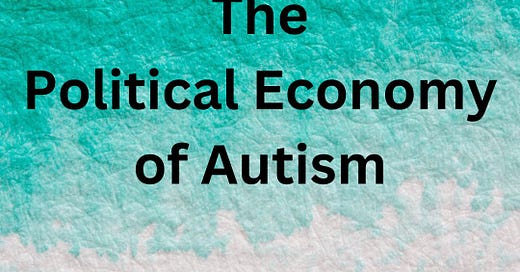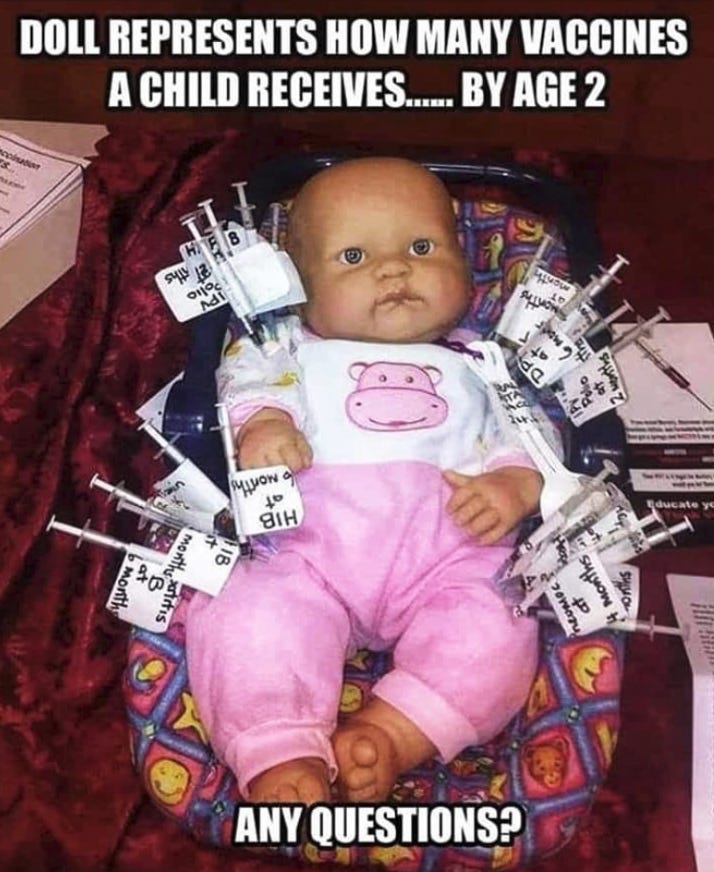I grew up with a PhD in the house, a large, green-bound volume of dense and inaccessible geology. By the time I was old enough to try, we had immigrated, and it was gone, left behind, and so I got to never read it.
Which brings me to Toby Rogers, who via his Sept 2020 article taught me about autism and vaccination.
The Political Economy of Autism - by Toby Rogers - uTobian (substack.com)
The title of his Substack piece was the same title of his PhD that he did at Sydney University.
The political economy of autism final final.docx (usyd.edu.au)
As I have said in previous stacks, autism, in my opinion, is simply (primarily) vaccine injury, with aluminium adjuvants the primary villain. But autism is simply a description of a spectrum of a particular type of neuro-developmental damage. What about delayed speech development, or years of bedwetting, or an inability to focus. These are clearly and simply different types and shades of neuro-developmental damage and impairment.
So really what Toby has done is write a PhD that could be titled The Political Economy of Vaccine Injury (he might not have gotten his PhD, and that title over the line at Sydney University), and that is a subject I am fascinated with.
I’ve decided to read Toby’s PhD, and it will be the first PhD I will have ever read and aim to write about some of it as I travel through it, with thoughts and comments. As you can see from the Table of Contents below, Toby covers some very interesting, and I think today very relevant, ground.
Vaccine injury is everywhere, once you see it, you cannot unsee it, and it produces its own economy which produces its own politics.
As Toby says, “the base determines the superstructure” and I am gradually coming to terms with the truth of that statement.
So, let’s get the show on the road with the opening Abstract of the PhD.
With thanks to Dr. Toby Rogers.
Abstract
Autism is a global epidemic. An estimated 1 in 40 children in Australia, 1 in 64 children in the U.K., and 1 in 36 children in the U.S. have an autism spectrum disorder (ASD).
This is an enormous increase from the first known autism prevalence study in the U.S. in 1970, that established an autism prevalence rate of less than 1 per 10,000. Several studies have shown that changes in diagnostic criteria account for only a small fraction of the increased prevalence.
Handley in How to end the Autism Epidemic explains that expanding the Autism definition to include Asperger only explains a 10% increase in cases.
Families of children on the spectrum face extraordinary additional expenses and decreased earnings as one parent often becomes a caregiver.
Autism cost the U.S. $268 billion (1.5% of GDP) in 2015; if autism continues to increase at its current rate, autism will cost the U.S. over $1 trillion (3.6% of GDP) in 2025 (as a point of comparison, U.S. Defense Department spending is 3.1% of GDP).
Let that sink in.
It maps over Kennedy Jr’ point that he made in an interview with Mike Tyson (I think Mike was stoned, but it was a great discussion).
All are directly linked to vaccines in the scientific literature. On our website we have 1,400 peer reviewed studies published on NIH's website PubMed, linking various vaccines to all of those injuries.
Well, they're making $60 billion a year selling us vaccines, but they're making $500 billion a year selling the remedies for the injuries caused by vaccines.
Over the last decade, several groups of leading epidemiologists, doctors, and public health experts have published consensus statements declaring that toxicants in the environment are contributing to the rising prevalence of neurodevelopmental disorders including autism. Beyond the consensus statements, a range of independent researchers have identified many additional factors that appear to increase autism risk.
Here is yet another recent piece of research, in August, from France.
Inflammation and Autophagy: A Convergent Point between Autism Spectrum Disorder (ASD)-Related Genetic and Environmental Factors: Focus on Aluminum Adjuvants
Conclusions
The present review focused on autism spectrum disorder, yet the link between autophagy impairment, neurodevelopment, and early exposure to Al adjuvants could hold true for other neuropsychiatric disorders, including schizophrenia, and bipolar disorder, now considered pieces of the same puzzle rather than separate entities (sharing clinical manifestations, vulnerability genes, and mechanisms).
Our review presents the lack of fundamental scientific data demonstrating that Al adjuvants are safe and do not induce any long-term side effects. It also supports further investigation related to the effects of early Al adjuvant exposures occurring in combination with genetic susceptibility factors, including autophagy, immune and inflammation process genes. As accumulating evidence shows that modulating the levels of autophagy may increase the risk of neurodevelopmental disorders, such studies will elucidate a new etiology for these complex disorders and contribute to develop potential new diagnostic and therapeutic tools.
Given rising prevalence rates and the extraordinary impacts of ASD on individuals, families, and communities, what explains why public health authorities, thus far, have failed to ban or restrict toxicants that have been shown to increase autism risk? I argue that autism is not only a public health issue, it also represents a crisis of political economy. In this thesis I will show that: capitalism has transformed science and medicine from a focus on use values to a focus on exchange values; regulation is largely a reflection of political power not scientific evidence; and cultural and financial capture are blocking the sorts of regulatory responses that are necessary to stop the autism epidemic.
Table of Contents
Part I: Background and context
Chapter 1: History, prevalence, and cost of autism
Chapter 2: Theoretical framework
Chapter 3: Histories of science and medicine
Chapter 4: Case studies in toxic chemical disasters
Chapter 5: The capitalist conquest of science and medicine
Part II: The failure to regulate toxicants associated with autism
Chapter 6: The failure to investigate possible environmental factors in general and the failure to regulate endocrine disruptors in particular in the U.S
Chapter 7: The failure to regulate herbicides and pesticides
Chapter 8: The failure to regulate selective serotonin reuptake inhibitors
Chapter 9: The political economy of the regulation of vaccines
Chapter 10: Conclusion
References
Thank you for reading this Substack.
Please consider a small paid subscription (donation). The money goes to a good cause.
I am always looking for good, personal GMC (pandemic and jab) or childhood vaccination stories. Shared stories are remembered and help others.
In the comments, please let me know what’s on your mind.
You can write to me privately: unbekoming@outlook.com
If you are Covid-jab injured, consider the FLCCC Post-Vaccine Treatment
Here are three eBooks I have produced so far:
FREE eBook: A letter to my two adult kids - Vaccines and the free spike protein






I did my best to read through Rogers' thesis awhile back. First, I skipped over the environmental factors but eventually go around to skimming through those as well. This was part of me trying to hear out the full anti-vaxxer argument in face of the FDA/CDC continuing to push the stupid covid vaccines onto healthy kids. Vindictive spite was the initial motive. To my surprise the anti-vaxxer side has so many compelling arguments both scientific and political that its unreal how long they've been dismissed and smeared. My take away from Rogers' thesis was that before you even get into the science, just the structure of the industry with liability taken off the table, and regulatory capture, its obvious such a system would create unsafe, unnecessary, products. Its seems inevitable given the true gravity of crony capitalism. The more people reading these arguments and talking about them the better.
I read Tony Roger’s thesis a few weeks ago! It was a first for me as well. Conflict Of Interest!!!! He’s brilliant to approach it from the socioeconomic perspective.
It looks more and more like a cult everyday. And so important to read sanity to help me through another day.